“Larry is a writer,” critic Dave Hickey once said of Larry McMurtry. “If you leave a cow alone, he’ll eat grass. If you leave Larry alone, he’ll write books. When he’s in public, he may say hello and goodbye, but otherwise he is just resting, getting ready to go write.”
This profligate dedication to writing helped propel McMurtry from humble beginnings in Wichita Falls, Texas to a household name, with books that have nabbed the Pulitzer Prize, adaptations that earned Academy Awards and Emmys, and even a National Humanities Medal for McMurtry himself.
In fact, McMurtry’s books have been adapted into films which received a massive 34 Oscar nominations and 13 wins, while his Pulitzer Prize-winning Lonesome Dove series was made into four TV miniseries which earned a massive 7 Emmys and netted some 26 nominations. McMurtry also won an Academy Award for Best Adapted Screenplay when he and Diana Ossana co-wrote the screenplay for Brokeback Mountain, adapted from the short story by Annie Proulx.
While McMurtry is best known as a writer of Westerns, he has also penned numerous acclaimed novels set in modern-day Texas, which have also often been adapted into award-winning films, including The Last Picture Show and Terms of Endearment.
Below, learn more about 10 Larry McMurtry books we think everyone should read.
.png?w=640)
Lonesome Dove
Larry McMurtry’s best-known work, Lonesome Dove, won the Pulitzer Prize when it was first published in 1985. Telling the story of a cattle drive from Texas to Montana, this sprawling work allowed McMurtry to “reinvent the Western novel by taking its basic elements and elevating them to the level of epic,” according to critic Nasrullah Mambrol.
Adapted into an Emmy-winning miniseries in 1989, Lonesome Dove has been called “the great cowboy novel” (New York Times) and proved to be McMurtry’s most enduring work, kicking off a series of sequels and prequels that all became bestsellers.
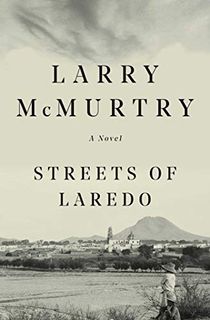
Streets Of Laredo: A Novel
Released in 1993, the first sequel to Lonesome Dove picks up several years after that novel left off, and follows the adventures of Call, one of the surviving heroes of the original book, as he pursues a Mexican bandit and moves toward the end of his life.
After the events of the previous book, Call, a former Texas Ranger, has resumed work as a bounty hunter, and he finds himself enlisted to track down a deadly adversary with hatred in his heart and a German rifle that can kill its target at a distance of half a mile.
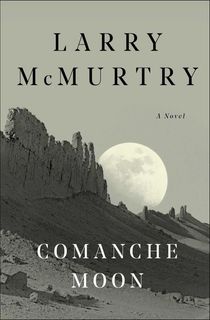
Comanche Moon
Larry McMurtry followed up the massive success of his initial Lonesome Dove novels with a pair of prequels, Dead Man’s Walk and Comanche Moon, showing the adventures of Gus McCrae and Woodrow Call when they were still Texas Rangers.
Of these, Comanche Moon was the last one published, released in 1997, though chronologically it takes place not long before the events of Lonesome Dove.
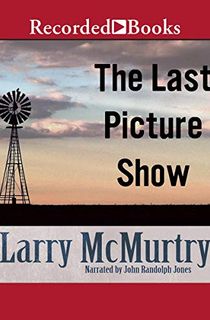
The Last Picture Show: Thalia Trilogy, Book 1
McMurtry’s first three novels were all initially published in the 1960s and all set in the fictional north Texas town of Thalia in the years following World War II. All three were adapted into acclaimed films, including Hud in 1963 (adapted from McMurtry’s Horseman, Pass By) and Lovin’ Molly in 1974 (adapted from Leaving Cheyenne).
Undoubtedly the most famous, however, is The Last Picture Show, which was originally published in 1966 and adapted into the movie of the same name in 1971, directed by Peter Bogdanovich, with a screenplay by Bogdanovich and McMurtry himself.

Terms of Endearment
Many of McMurtry’s novels form themselves into loose series featuring recurring characters, such as his “Houston series,” published between 1970 and 1992, which features a rotating cast of characters living in the Houston area. Of the six books in the series, the best-known is this 1975 novel about the relationship between a mother and daughter, the strains their family undergoes, and the ties that bind them together.
Spanning some three decades, the story was made into an Academy Award-winning movie in 1983 starring Debra Winger, Shirley MacLaine, and Jack Nicholson, who won his second Oscar for his supporting role as retired astronaut Garrett Breedlove.
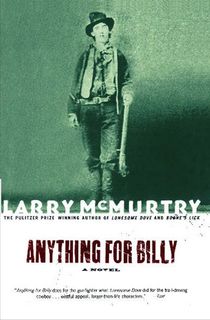
Anything for Billy
McMurty’s fictionalized biography of legendary outlaw Billy the Kid “does for the gunfighter what Lonesome Dove did for the trail-driving cowboy,” according to TIME magazine.
Filled with larger-than-life characters as only McMurtry can write them, this tale of Billy the Kid’s life, death, and ultimate legend was hailed by USA Today as “one of McMurtry’s best,” while The Seattle Times called it “storytelling at its best, the West at its fiercest, and McMurtry in his prime.”
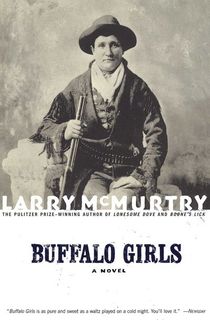
Buffalo Girls
Following up his fictionalized biography of Billy the Kid, McMurtry turned similar attentions to Calamity Jane in this 1990 novel, which was adapted into the 1995 miniseries of the same name starring Anjelica Huston and Melanie Griffith.
Set amidst the settling of the West, the novel depicts a dying way of life, as the cowboys, fur trappers, soldiers, and other denizens of the frontier struggle (and often fail) to adapt to a changing world.
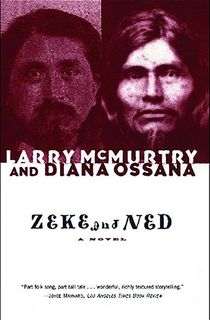
Zeke and Ned
McMurtry’s string of fictionalized biographies continued with the aid of co-writer Diana Ossana, with whom he also wrote the screenplay for Brokeback Mountain.
Among these is Zeke and Ned, the story of the “last Cherokee warriors,” men who remember the Trail of Tears and who illuminate the Cherokee struggle against white authority and the human condition that unites all of us, no matter what our backgrounds may be.
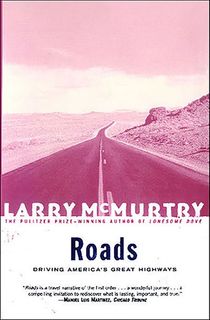
Roads
In addition to his various novels, Larry McMurtry also wrote a number of nonfiction books. Roads, which is subtitled “Driving America’s Great Highways,” is part travelogue, part memoir. Roads chronicles McMurtry’s journey across the great highways of America, to “look at the country again, from border to border and beach to beach.”
In describing his method, he says that it is modeled on rereading. “I want to reread some of the roads as I might a book,” he wrote. The result is a book that is as much about the heart and soul of America as any of McMurtry’s celebrated novels.
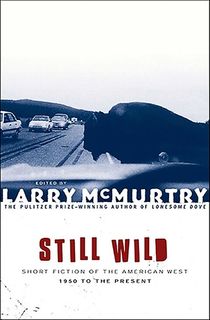
Still Wild
The Western, as a genre, enjoyed its greatest heyday in the first half of the 20th century. However, as one of the most celebrated practitioners of the form in the latter half of the 20th century, McMurtry took it upon himself to also introduce readers to some of the other important voices working in the genre from the 1950s onwards.
He did so in this one-of-a-kind volume of Western short stories, featuring tales by the likes of Jack Kerouac, Raymond Carver, Annie Proulx, and many others, all selected and edited by McMurtry himself.
Featured photo: Vladimir Vujeva / Unsplash

.png?w=640)

